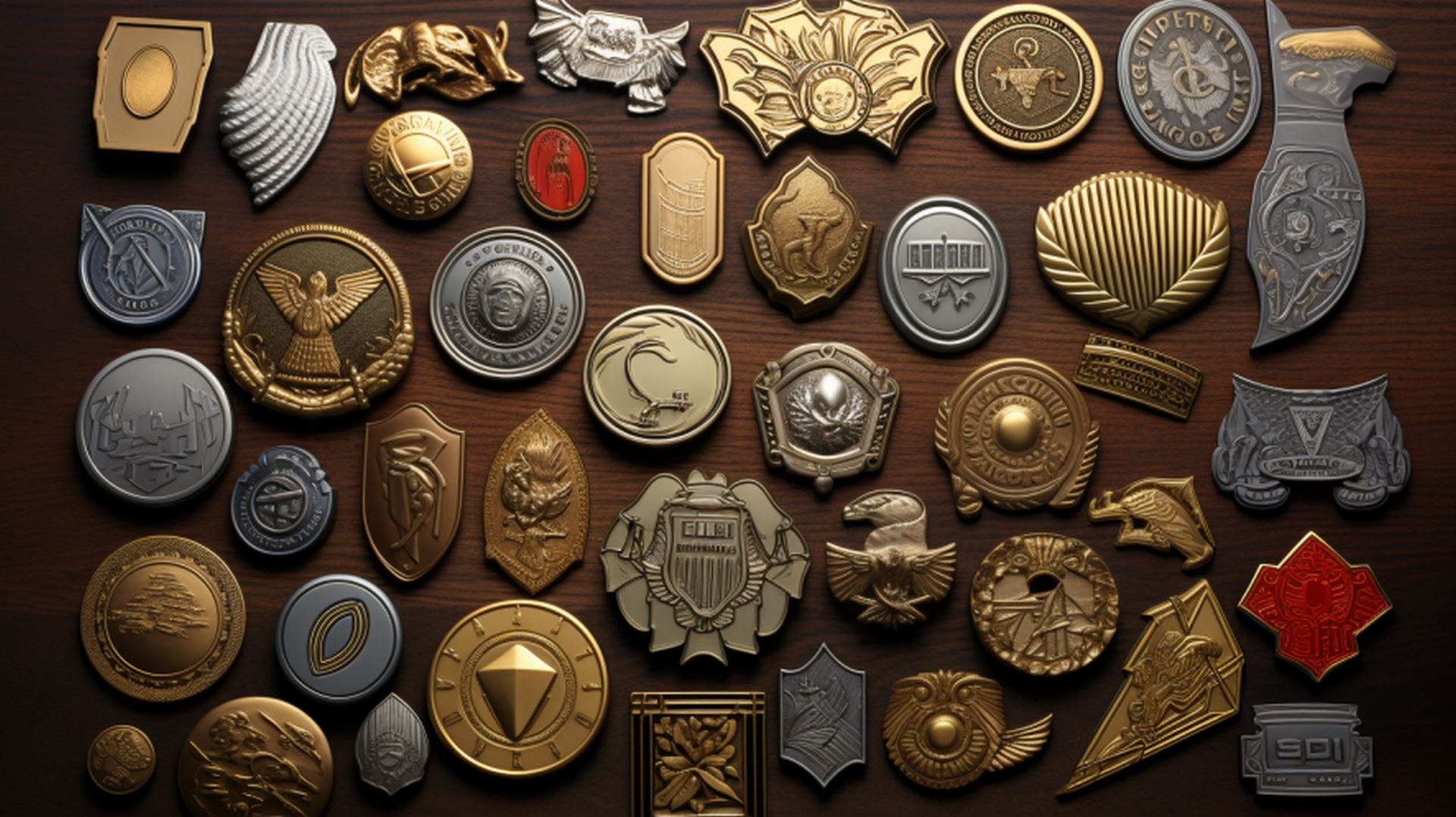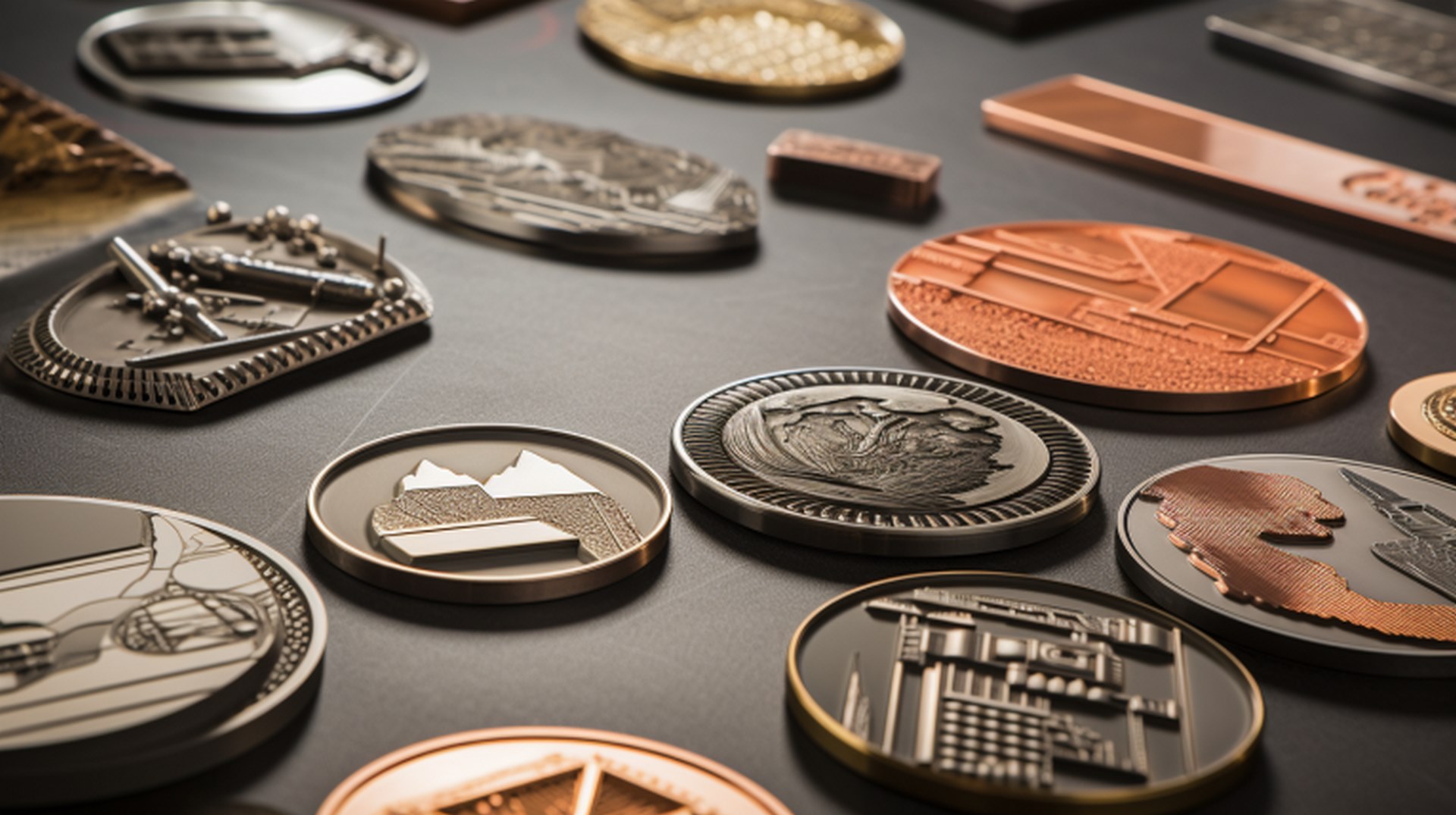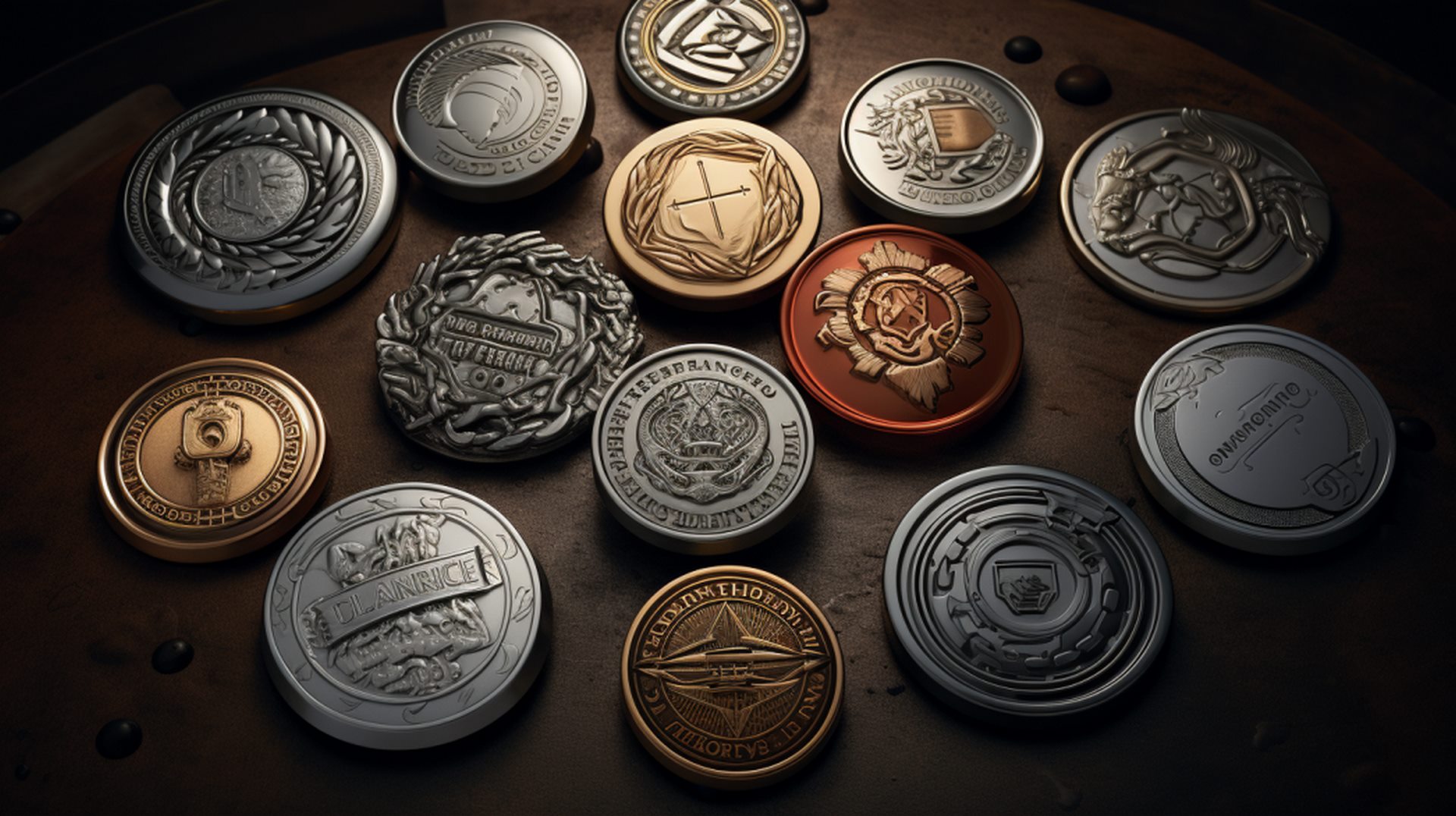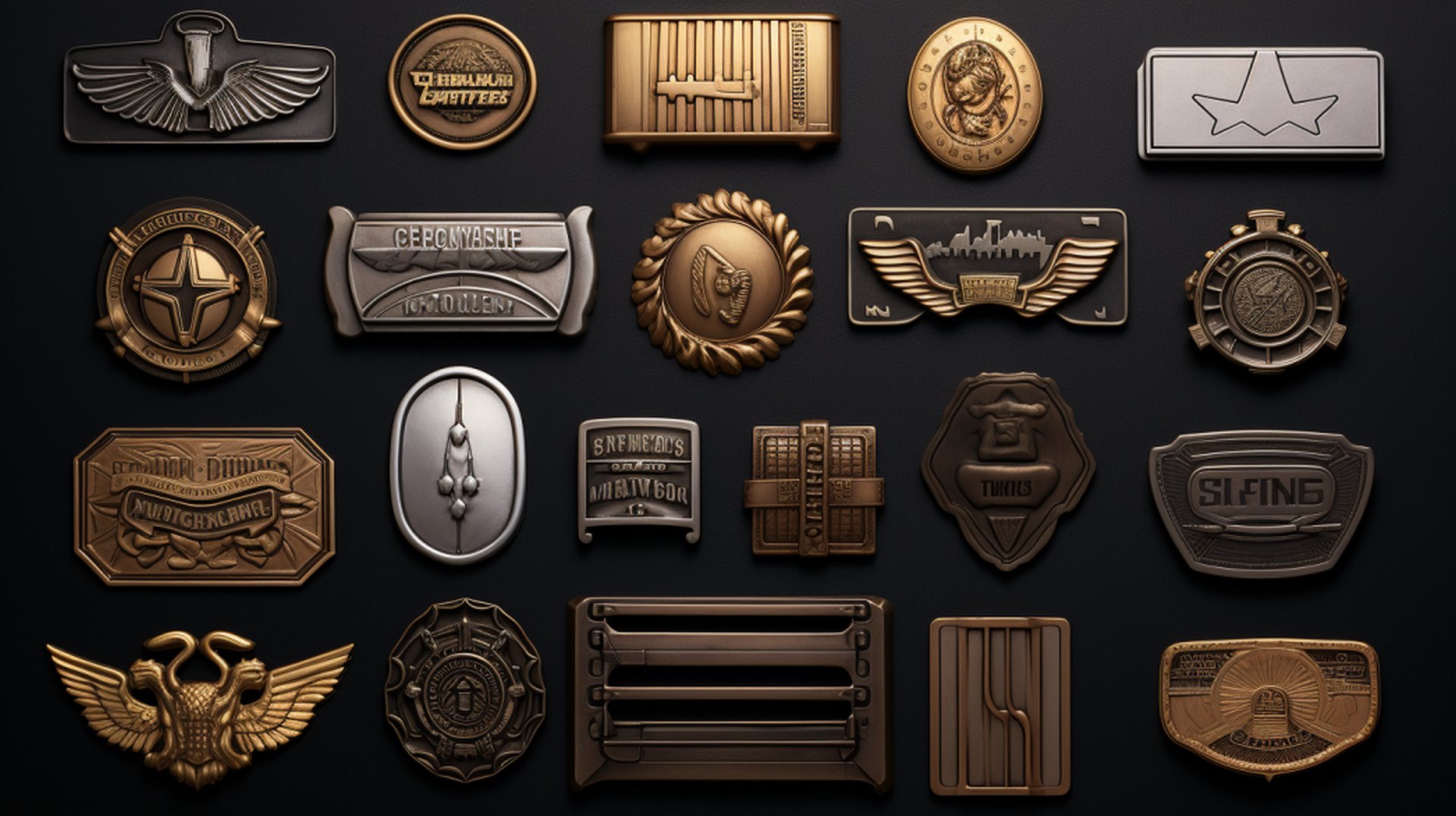Are you curious about the shiny emblems that adorn uniforms and lapels? Well, buckle up because we're about to take you on a metal-filled journey!
In this article, we'll dive into the world of badge making and explore the different types of metals used. From sterling silver to brass and everything in between, we'll uncover the pros and cons of each option.
So, get ready to discover what metal suits your badge best!
Key Takeaways
- There are several types of metals commonly used in badge making, including brass, aluminum, stainless steel, copper, and zinc.
- Factors such as durability, appearance, weight, and cost should be considered when selecting the metal for a badge.
- Brass is classic and durable but can be heavy and require maintenance.
- Stainless steel is strong and resistant to tarnish, making it suitable for long-term use.

If you're wondering about the different types of metals used for badges, there are several options to choose from. One popular choice is brass, which is known for its durability and attractive golden color. Brass badges have a classic look that can withstand wear and tear, making them perfect for long-lasting recognition.
Another common metal used in badge making is aluminum. Aluminum badges are lightweight yet sturdy, making them ideal for everyday use. They can be anodized to achieve different colors, giving you more design flexibility.
Stainless steel is also a popular option due to its strength and corrosion resistance. It's commonly used in high-quality badges that need to withstand harsh environments or heavy-duty applications.
Transitioning into the next section about common metals used in badge making, it's important to consider the specific requirements of your badge project before choosing a metal type. Different metals offer various benefits and visual appeal, so understanding their characteristics will help you make an informed decision on which one suits your needs best without compromising quality or style.

Copper and aluminum are commonly used in making badges. These metals have distinct properties that make them ideal for creating durable and visually appealing badges.
Copper is a popular choice due to its malleability, which allows intricate designs to be easily formed. It also has excellent conductivity, making it suitable for badges with electronic components. Additionally, copper's reddish-orange hue gives badges a distinctive and luxurious appearance.
On the other hand, aluminum is preferred for its lightweight nature and resistance to corrosion. This makes aluminum badges perfect for outdoor use or in environments where moisture is present.
When selecting the metal for your badge, there are several factors to consider. Firstly, you need to think about the intended purpose of the badge. Will it be worn daily or just occasionally? If durability is crucial, then copper may be the better option due to its strength and resistance to wear over time.
Secondly, budget plays a significant role in metal selection. Aluminum tends to be more affordable compared to copper, making it an attractive choice if cost is a concern.

When deciding on the metal for your badge, it's important to consider factors such as durability requirements and budget constraints. Here are some key points to keep in mind:
- Durability: You want a metal that can withstand everyday wear and tear without losing its shine or shape.
- Appearance: The metal should enhance the overall look of your badge, whether you prefer a sleek and polished finish or a more rustic and vintage feel.
- Weight: Depending on how you plan to use the badges, you might want to choose a lighter metal for comfort or a heavier one for added prestige.
- Cost: Budget is always a consideration. Different metals come with varying price tags, so make sure to factor this into your decision-making process.
Considering these factors will help ensure that you end up with the perfect badge metal that meets both your practical needs and personal preferences.
Now let's move on to explore the pros and cons of different badge metals...

One popular option for badge materials is brass, as it offers a classic and timeless look. Brass badges have been used for centuries due to their durability and ability to hold intricate designs. They are resistant to corrosion and tarnish, making them suitable for long-term use. Another advantage of brass badges is that they can be easily customized with various finishes, such as gold or silver plating, giving them a luxurious appearance.
However, brass badges do have some drawbacks. One disadvantage is that they can be relatively heavy compared to other metals, which may not be ideal if you need to wear your badge for extended periods. Additionally, brass does require regular maintenance to keep its shine intact.
When choosing the right metal for your badge, there are several factors to consider. Firstly, think about the purpose of the badge and the image you want to portray. If you are looking for a high-end and prestigious feel, options like gold or silver may be more suitable. On the other hand, if you prefer a modern and contemporary look, stainless steel or aluminum might be better choices.

To choose the right material for your badge, consider factors such as the image you want to convey and the purpose of your badge. The material you choose will greatly impact how your badge looks and feels.
Here are some factors to keep in mind:
- Brass: This classic metal gives off a timeless and elegant vibe. It has a warm golden hue that adds a touch of sophistication to any design.
- Stainless Steel: If you're looking for durability and strength, stainless steel is the way to go. It's resistant to tarnish and corrosion, making it perfect for badges that need to withstand wear and tear.
- Zinc Alloy: This versatile metal allows for intricate detailing and unique shapes. It can be plated with various finishes like gold or silver, giving you plenty of options to customize your badge.
- Aluminum: Lightweight and affordable, aluminum is a popular choice for badges that need to be worn daily. It's easy to engrave or print on, making it ideal for badges with intricate designs.
Consider these factors when choosing the material for your badge, as they will help you create an image that aligns with your brand or organization while serving its intended purpose effectively.
So there you have it! Now that you know the different types of metals used in badge making, the factors that affect metal selection, and the pros and cons of each metal, you can confidently choose the right metal for your badge.
But here's an interesting theory to consider: what if the type of metal used in a badge actually affects its durability and symbolism? It might be worth investigating this further to add depth to your understanding and hook the audience with new insights.

